Other Publications
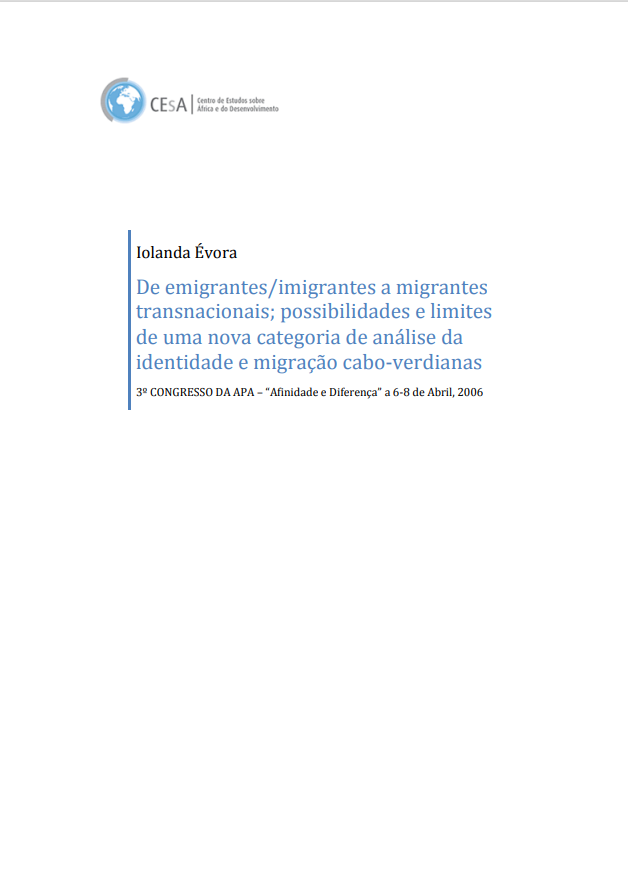
De Emigrantes/Imigrantes a Migrantes Transnacionais; Possibilidades e limites de uma nova categoria de análise da identidade e migração cabo-verdianas
Abstract:
In the field of Cape Verdean migration, transnationalism has been consolidating itself as a new lens for approaching the old experiences of exchanges and participation in social practices that transcend national borders. At the same time, studies on Cape Verdean identity and migration show the preponderance of the dual existence of emigrants/immigrants as a way of recognizing people and groups. In De emigrantes/imigrantes a migrantes transnacionais; possibilidades e limites de uma nova categoria de análise da identidade e migração cabo-verdianas, we propose to examine the correspondences or oppositions between the evident consolidation of Cape Verdean transnationalism as an object of study of the social sciences and the possibilities of constituting a new identity constellation through which individuals and groups recognize themselves as transnational migrants. Transnationalism and identity are concepts whose juxtaposition seems inherent, insofar as, as a social field, transnationalism includes sociological variables that exert a discernible effect on the psychological field of identity. From the perspective of the social field, the changes that the transnational way of living operates in the ways of living assimilation/exclusion in places of immigration and, among other ties, the myth of the return to origin, will be examined. A new dynamism in the construction, negotiation and reproduction of identities means, for each actor, defining themselves differently in terms of class, race and gender. In addition, other social categories may emerge in this context, and even with different degrees of salience among themselves, in the social field, they support the need for new reference structures that can capture the social and economic experiences of migrants in different places.
Quotation:
Évora, Iolanda. 2011. “De emigrantes/imigrantes a migrantes transnacionais; possibilidades e limites de uma nova categoria de análise da identidade e migração cabo-verdianas”. Comunicação apresentada ao 3º Congresso da APA – Afinidade e Diferença. Lisboa
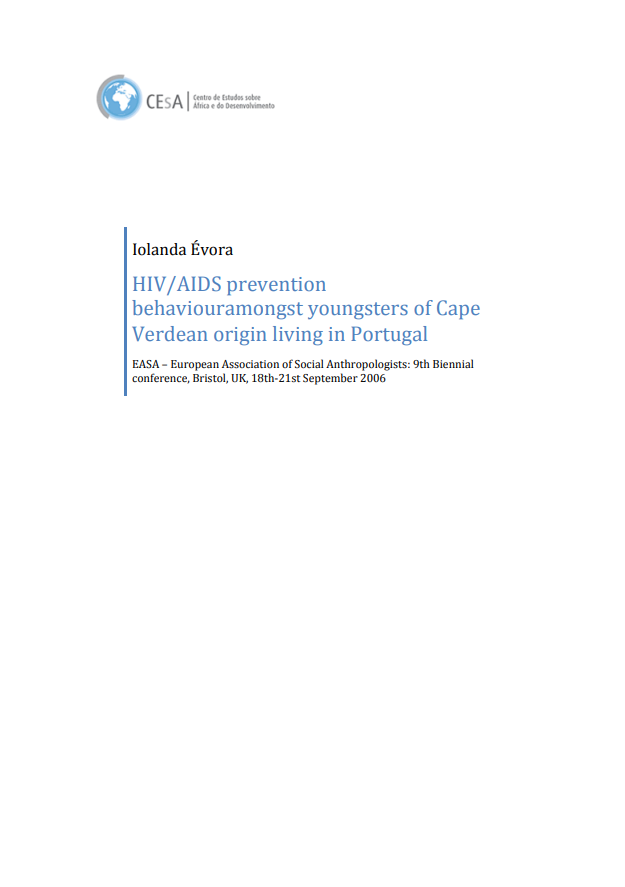
HIV/AIDS Prevention Behaviour Amongst Youngsters of Cape Verdean Origin Living in Portugal
Abstract:
This paper deals with the preventive AIDS behaviour of youngsters of Cape Verdean origin living in Lisbon. It focuses on the group practices and representations of AIDS and gender oriented sexual behaviour. Based on an ongoing research project, the paper argues how AIDS has the potential to become another discriminatory factor in a group already racially and socially stigmatized. This research aims to understand the relation between what young people know about HIV/AIDS and their active prevention behaviour. In addition, it explores how the immigration context may interfere in their behaviour and opinions towards HIV/AIDS and in the practices considered the safest ones to adopt. Therefore, this research is amongst those that aim to ground HIV/AIDS health education proposals on a clear understanding of how different populations or groups conceive their own healthcare. For that purpose, we selected a sample of young people from Cape Verdean origin presently living in Portugal, born in or outside of Cape Verde. Both genders were equally present (8 men and 7 women), aged between 16 and 26 and living in council estates, in other words, housing built on council’s urban redevelopment projects to relocate people from the slums. The areas of interest were chosen for presenting a high number of Cape Verdeans or their descendents: Lisbon, the Greater Lisbon and Loulé. We presuppose that belonging to these areas implies a particular social and economical context; for, although debatable, the definition of ‘council relocation housings’ conveys, to a great extent, a social categorization applied by a system of social classification to immigrants in Portugal. Accordingly, we considered eventual repercussions on the youngsters’ social experience and on their material and symbolic existential conditions, upon which rely daily decisions concerning health and prevention. A qualitative methodology of data collection was adopted, to allow an exhaustive explanatory study and the identification of several perceptual and behavioural patterns. Such methodology, developed by Rodrigues (1978,1999), is the most adequate to reach ‘irrational’ content – denomination commonly applied in Social Sciences to factors that “exist, but cannot be apprehended by reason” (Rodrigues, 1999, p.4). As the author refers, it is about reaching “that which cannot be measured, but is worthy of being known”, more specifically, the emotional content and deeper meaning of youth’s explanations regarding HIV/AIDS prevention behaviour. Thorough individual interviews were carried out, aiming to collect a material able to reveal the representations, the type of perception, the explanatory resources used, the justifications produced according to the roles occupied within a certain group, particularly, their position regarding immigration and HIV/AIDS. By using self-examination (free discourse), we were able to identify main areas of interest and concern, their importance, how they interrelate with their life and the surrounding world. Moreover, aiming to identify exactly how the interviewees place the AIDS issue within their life concerns. Intermediary Questions enable us to explore HIV/AIDS issues relevant to the project, though not spontaneously raised by the youngster during the Free Discourse approach. The Socioeconomic Questionnaire enabled an understanding of the life conditions of this group in Portugal, as well as of their family history. Today we shall discuss here the subject of family migration in its different phases and by each individual.
Quotation:
Évora, Iolanda. 2011. “HIV/AIDS prevention behaviour amongst youngsters of Cape Verdean origin living in Portugal”. Comunicação apresentada na EASA – European Association of Social Anthropologists : 9th Biennial Conference, Bristol, United Kingdom.
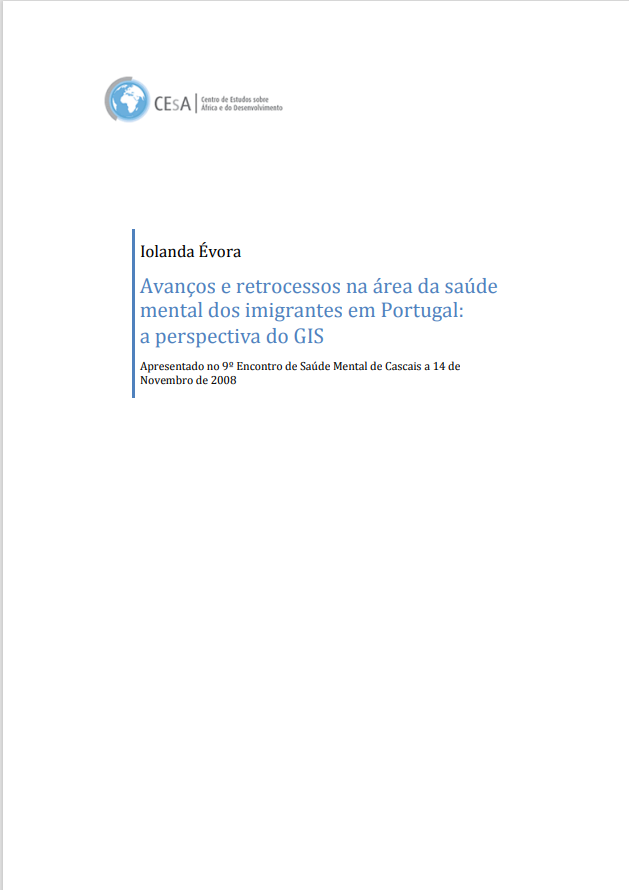
Avanços e Retrocessos na Área da Saúde Mental dos Imigrantes em Portugal: A perspectiva do GIS
Abstract:
The GIS Association (formally called Salpisign-GIS Association) is a non-profit association dedicated to research, service delivery and intervention in the area of migration and health. We focus on migrants, refugees and ethnic minorities, as well as on the quality of health services and intercultural training of health workers. In our action, we see the access to health as a fundamental right of an inclusive society in the expression of the rights and duties of citizenship. The GIS Association was created in 2007 and consists of 7 members (coincidentally, all female: anthropologists, social psychologists, sociologists and philosophers) and works in collaboration with other professionals and researchers, according to projects under development. The GIS Association – Immigration and Health Group has as its main objective the promotion of the health of the migrant population, through the development of research, training and intervention actions, through the creation of scientific, technical and informative dialogues between the Medical Sciences, the Social Sciences and Humanities and the socioculturally constituted knowledge of the immigrants and refugees themselves. Avanços e retrocessos na área da saúde mental dos imigrantes em Portugal: a perspectiva do GIS was presented at the 9th Cascais Mental Health Meeting on 14.11.08
Quotation:
Évora, Iolanda. 2011. “Avanços e retrocessos na área da saúde mental dos imigrantes em Portugal: a perspectiva do GIS”. Comunicação apresentada no 9º Encontro de Saúde Mental, Cascais.
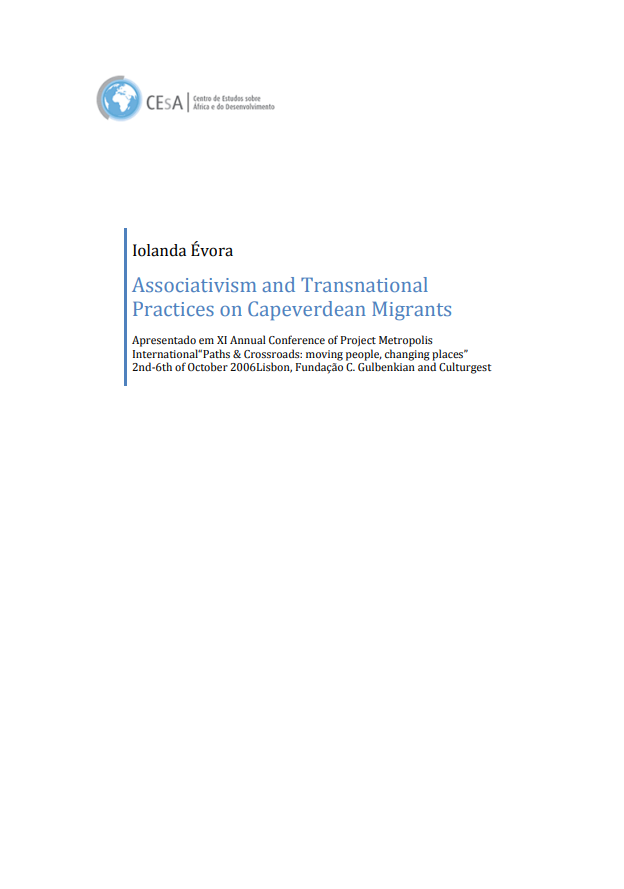
Associativism and Transnational Practices on Capeverdean Migrants
Abstract:
In Associativism and Transnational Practices on Capeverdean Migrants”. Comunicação apredentada na XI Annual Conference of Project Metropolis International “Paths & Crossroads: moving people, changing places we propose a reflection on the role that the Capeverdean immigrant associations have towards the intensification of transnational practices in the Capeverdean community. We consider that transnationalism as a characteristic per excellence of the contemporary Capeverdean migration creates a change in the goal set by associations which are traditionally involved either by defending the origin of the identity or by social inclusion from the place of destiny. We reached the conclusion that transnational immigrants are not yet identified in their specific needs by associative organizations. However, studies have demonstrated that like transnational collective strategies such as the Congresso de Quadros Cabo-verdianos da Diáspora for example, transnational practices of the small immigrant supported by informal networks of a more spontaneous character are also an important sign of the passing of a Diaspora to a transnational community alloying to identify the practice of an active migratory culture and the appeal to an accumulated migratory knowledge which aids the implementation of intense and frequent types of circulation and contact amongst the different Diaspora cores.
Quotation:
Évora, Iolanda. 2011. “Associativism and Transnational Practices on Capeverdean Migrants”. Comunicação apredentada na XI Annual Conference of Project Metropolis International “Paths & Crossroads: moving people, changing places”, Fundação C. Gulbenkian and Culturgest,Lisbon.
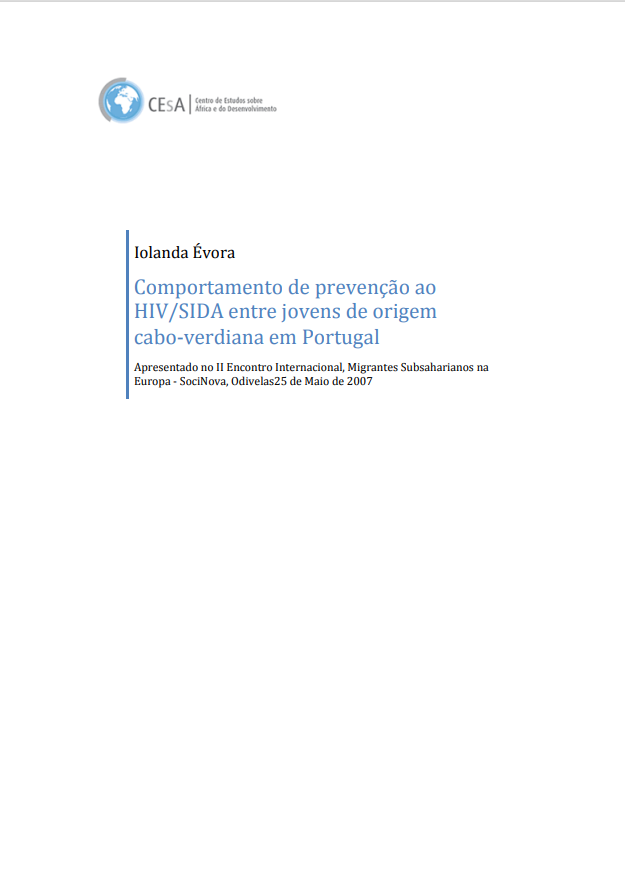
Comportamento de prevenção ao HIV/SIDA entre jovens de origem cabo-verdiana em Portugal
Abstract:
This study that we carried out, and whose partial results are presented here, deals with the prevention behavior of the young Cape Verdean population immigrated to Portugal in relation to HIV/AIDS. The promoters of Comportamento de prevenção ao HIV/SIDA entre jovens de origem cabo-verdiana em Portugal were two Cape Verdean institutions: the Ministry of Foreign Affairs and the Cape Verde AIDS Coordination Committee, sponsored by the World Bank. The aim of this study was to understand the relationship (or gap) between the knowledge that young people have about HIV/AIDS and their day-to-day prevention practices. Likewise, we tried to explore the possible interferences of the immigration factor in the attitudes and theories of young people about HIV/AIDS and the behaviors they consider the safest. The study is, therefore, among those that seek to support health education proposals related to HIV/AIDS, based on the understanding of the way in which different populations or communities conceive health care. The study was carried out with young people of Cape Verdean origin living in Portugal, whether or not they were born in Cape Verde. We cover both sexes equally (8 men and 7 women), aged between 16-26 years and living in social relocation neighborhoods, that is, neighborhoods built by municipal structures to replace slums. The regions covered were those with a large number of Cape Verdeans and their descendants: Lisbon, Greater Lisbon and Loulé. We believe that belonging to such spaces circumscribes the social and economic situation of this group because, although questionable, the definition of rehousing neighborhoods contains a social categorization, to a large extent, attributed by the dominant social classification system to young people of immigrant origin in the country. Therefore, we consider this definition because of its implications in the social experience of these young people and in the material and symbolic conditions of existence, on which daily decisions regarding health care and prevention depend. We chose to use a qualitative methodology for data collection that would allow for an in-depth exploratory study and the identification of certain patterns of behavior and perception. This methodology, developed by Rodrigues (1978, 1999) seemed to us to be more suitable for reaching irrational contents, a name that is often attributed by the social sciences to factors that “exist, but cannot be apprehended by reason” (Rodrigues, 1999, p.4). ). As the author says, it is about trying to achieve “what cannot be measured, but which is worth knowing”, that is, the emotional contents and deeper meanings of young people’s explanations about preventive behaviors in relation to HIV/AIDS. We carried out in-depth individual interviews in order to lead the subjects to produce material capable of revealing the representations, the type of perception, the explanatory resources used and the explanations they produce, based on the positions they occupy within their groups, in particular, the position on immigration and HIV/AIDS. Based on self-reflection (free speech), we identified the themes of interest and concern of each young person interviewed, the sequence of themes and the way in which the young person interconnects aspects of his life and his world. Above all, we sought to recognize the place where subjects place the issue of AIDS among the themes of their lives. With the Intermediate Questions, we proposed in Comportamento de prevenção ao HIV/SIDA entre jovens de origem cabo-verdiana em Portugal to explore the issues about HIV/AIDS that were of interest to the project and that had not been brought up, spontaneously, by the young person in the first part of the free speech. Finally, the Socio-Economic Questionnaire made it possible to reach the living conditions of this group in Portugal and also their family history. Here we include questions about the migration of your family group in its different stages and for each of its members.
Quotation:
Évora, Iolanda. 2011. “Comportamento de prevenção ao HIV/SIDA entre jovens de origem cabo-verdiana em Portugal”. Comunicação apresentada no II Encontro Internacional, Migrantes Subsaharianos na Europa, SociNova, Odivelas.
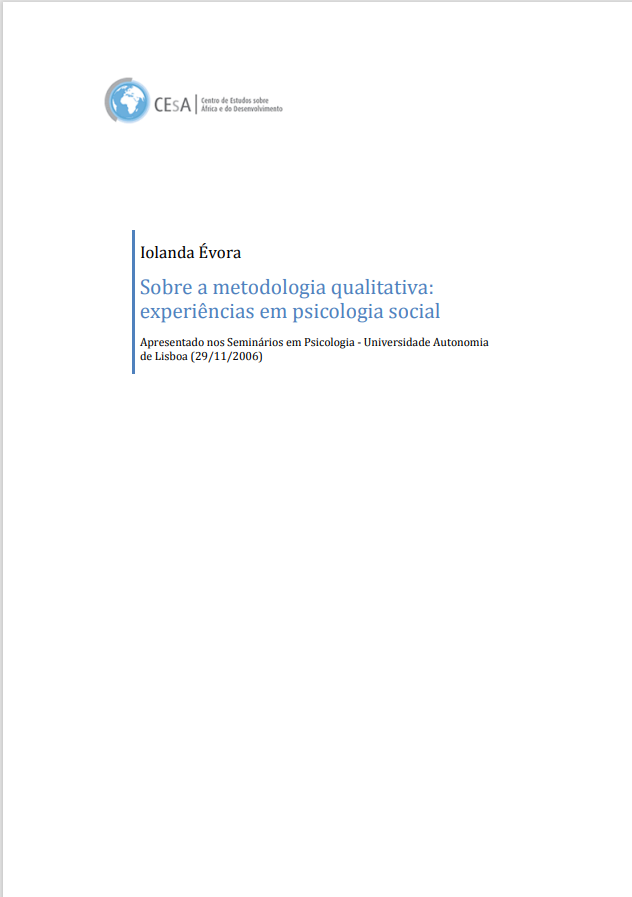
Sobre a Metodologia Qualitativa: Experiências em psicologia social
Abstract:
Often, the reference to qualitative methodology leads us to the great controversy about the scientificity of the social sciences in comparison with the natural sciences and to doubts about the attribution of the status of “science” to the social field, studied in Sobre a metodologia qualitativa: experiências em psicologia social. There are those who argue that this attribution (of scientificity) will only be possible if the same procedures are applied to the social that are used to understand the natural. For others, on the contrary, the important thing is to claim the total difference and specificity of the human field and to show that the work for the knowledge of the social must reach the symbolic, historical and concrete orders. In the symbolic dimension, the meanings of the subjects are included; the historical dimension – of time consolidated in the real and analytical space – includes the fact that social actors resort to their experience and memory to recompose facts that took place within their temporality. The concrete dimension is related to the structures and social actors in relation. Hence the statement that the social sciences deal with phenomena marked by relativity, unpredictability and specificity.
Quotation:
Évora, Iolanda. 2011. “Sobre a metodologia qualitativa: experiências em psicologia social”. Comunicação apresentada nos Seminários em Psicologia, Universidade Autonomia de Lisboa
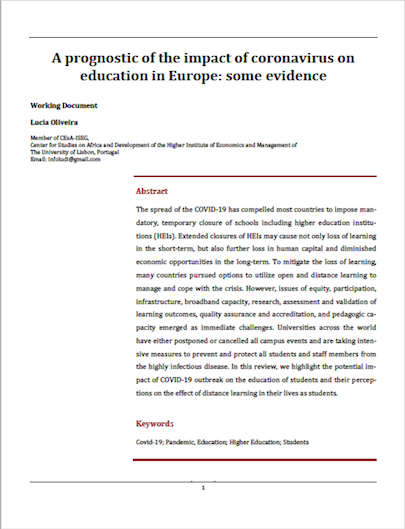
A prognostic of the impact of coronavirus on education in Europe: some evidence
In A prognostic of the impact of coronavirus on education in Europe: some evidence, Lúcia Oliveira highlights the impact of the COVID-19 outbreak on student education and their perceptions corcerning the effect of distance learning on their lives as students. Thus, we conducted a survey to university students in Portugal, during the month of July, who composed a sample of convenience due to time constraints and at the end of the school year, which made the collection of information extremely important to evaluate the real impact at that very moment, taking also into account other external factors. We found out that students live difficult moments at the educational and private level due to the complex professional situation of their parents. All of these factors have a major impact in terms of mental health, as many of them reported experiencing anxiety and stress.
Abstract:
The spread of COVID-19 forced most countries to temporarily close educational institutions. It may cause not only short-term learning loss, but also an additional loss of human capital and reduced long-term economic opportunities. To mitigate this loss, many countries have opted for distance learning. However, issues of equity, participation and evaluation of results emerged as challenges. Universities have postponed or cancelled classes and are taking measures to protect all students and staff from highly infectious diseases. In this study, we highlight the impact of the COVID-19 outbreak on student education and their perceptions corcerning the effect of distance learning on their lives as students. Thus, we conducted a survey to university students in Portugal, during the month of July, who composed a sample of convenience due to time constraints and at the end of the school year, which made the collection of information extremely important to evaluate the real impact at that very moment, taking also into account other external factors. Given the exploratory nature of this empirical research, data analysis is descriptive, measuring opinions, attitudes and perceptions that students have about the impact of the pandemic on their educational path. We found out that students live difficult moments at the educational and private level due to the complex professional situation of their parents. All of these factors have a major impact in terms of mental health, as many of them reported experiencing anxiety and stress. It will be a challenge for universities to deal with this new reality, to prepare an uncertain future not only for students, but also for professionals, who will need more preparation and training to face the new teaching methodologies.
Quotation:
“A prognostic of the impact of coronavirus on education in Europe: some evidence.” 4. International Seminar. Education, Territories and Human Development. Catolica, Faculty of Education and Psychology, Porto. pp. 550-557 https://www.fep.porto.ucp.pt/sites/default/files/files/FEP/eventos/Atas-SIETDH-2021.pdf https://www.repository.utl.pt/handle/10400.5/23273
Access the article here.





